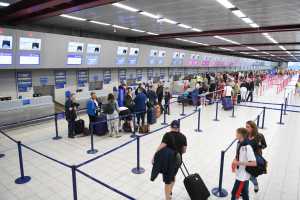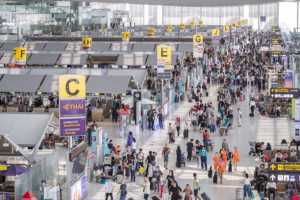
Arriving in Thailand in May 2022? Here's everything you need to know about it.
29th Apr 2022

On April 22, the CCSA announced substantial changes for all visitors to Thailand, whether Thai or international, vaccinated or unvaccinated.
On April 29, at 1 minute past midnight, registration for the updated Thailand Pass opened.
International travelers will no longer be required to take a PCR test either before or after their trip.
The CCSA ruling also eliminates the obligation to book a SHA+ hotel as part of the Test & Go entrance process. However, you should double-check the terms of your journey to Thailand because some airlines may need a PCR test or confirmation of immunization.
Everyone, Thais and foreigners alike, must still have a Thailand Pass. Before you arrive in Thailand, you must upload and pre-approve all of your documents, including your passport, immunization certificates, and proof of insurance. It normally takes no more than three days for this to be approved.
You can forget about Test & Go and Sandbox because they are no longer available. Vaccinated and unvaccinated people will be the only ones allowed to enter. That is all there is to it.
International travelers who have had full Covid-19 vaccination will no longer be required to take a PCR test (both pre-boarding and on arrival). The CCSA still advises travelers to take an ATK test on the fifth day and expects them to keep track of their health while in Thailand, but it is not required.
The amount of insurance coverage required will also be reduced from US$20,000 to US$10,000. This is separate from travel insurance and is particular to Covid.
If an unvaccinated or under-vaccinated traveler takes a pre-travel PCR test within 72 hours of departure and the result is negative, they will be able to enter Thailand in the same way as vaccinated travelers do, with no pre-paid lodging, on-arrival testing, or quarantine. If they are unable or unable to perform a PCR test, they must reserve 5 days of quarantine hotel accommodation in advance. On the fifth day, perform an ATK test. If the result is negative, you can leave and continue your journey.
Insurance is still necessary for international travelers. You must have a $10,000 insurance policy that covers hospitalization for any Covid treatments. It used to cover up to a value of US$50,000 until the CCSA reduced it to US$20,000 in March, and it currently only covers up to a value of US$10,000.
You won't need the supplementary Covid insurance if you have a valid Thai work permit. Thais who are insured under the country's universal healthcare system are in the same boat.
Here are the steps to follow if you take a volunteer ATK test and need to report it to anyone.
Although the elimination of testing for most travelers after May 1 is welcome news, there may be even better news on the way.
The Thailand Pass might be canceled as early as June 1, according to the Ministry of Tourism and Sports. Travelers will have to rely on their TM6 immigration arrival papers to prove their immunizations now that the Thailand Pass is no longer available. At this time, this is only a suggestion that has to be addressed by the CCSA.
The much-discussed and reviled Thailand Pass might be phased out as early as June if the CCSA approves the proposals. Nobody knows if they'll use the old TM6 arrival cards or have Immigration officials examine immunization data.
You still need to apply for a Thailand Pass at the time of publishing this post. If you already have a valid Thailand Pass and plan to travel after May 1, the CCSA says you won't need to reapply and will be admitted under the new terms. You will then be able to request a refund from your SHA+ hotel for the one night stay you paid for when applying for the old Thailand Pass.
During this time, as Thailand transitions from the previous Thailand Pass to the new 'test free' version, you must check with your airline to ensure that you meet their flight criteria, which may include PCR tests or vaccination.
Under the conditions of the emergency decree, which is still in effect as of the end of April, everyone in Thailand is required to wear a facemask in public (until at least the end of May). At the CCSA's bi-monthly meetings, further restrictions in Thailand are modified, and the Thaiger always publishes updates to all Covid restrictions.
Also, following May 1, the official drinking time was raised to midnight, but alcohol laws are now only loosely enforced, particularly in tourist areas throughout the country.







